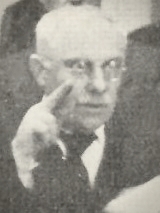Vlatko Maček
| Vladko Maček | |
|---|---|
 |
|
| 2nd President of the Croatian Peasant Party | |
|
In office 13 August 1928 – 15 May 1964 |
|
| Deputy | Josip Predavec August Košutić |
| Preceded by | Stjepan Radić |
| Succeeded by | Juraj Krnjević |
| Deputy Prime Minister of Yugoslavia | |
|
In office 26 August 1939 – 7 April 1941 |
|
| Monarch | Peter II of Yugoslavia |
| Prime Minister | Dragiša Cvetković (until 1941) Dušan Simović (1941) |
| Preceded by | Office established |
| Succeeded by | Juraj Krnjević |
| Leader of the Opposition | |
|
In office 13 August 1928 – 26 August 1939 |
|
| Monarch | Alexander I of Yugoslavia Peter II of Yugoslavia |
| Personal details | |
| Born |
20 June 1879 Kupinec, Jastrebarsko, Croatia-Slavonia, Austria-Hungary |
| Died | 15 May 1964 (aged 84) Washington D. C., United States |
| Nationality | Croat |
| Political party | Croatian Peasant Party |
| Other political affiliations |
International Agrarian Bureau |
| Children | 2 |
| Alma mater | University of Zagreb |
| Profession | Lawyer |
| Awards | Grand Order of King Dmitar Zvonimir (2004) |
| Military service | |
| Allegiance | Austria-Hungary |
| Service/branch | Army |
| Years of service | 1914–1918 |
| Rank | Captain |
Vladimir "Vladko" Maček (20 June 1879 – 15 May 1964) was a Croatian politician in the Kingdom of Yugoslavia and as a leader of the Croatian Peasant Party (HSS) following the 1928 assassination of Stjepan Radić, was a leading Croatian political figure until the Axis invasion of Yugoslavia in 1941. As a leader of the HSS, Maček played a key role in establishment of the Banovina of Croatia, an autonomous banovina in Yugoslavia in 1939.
Maček was born in Kupinec near Jastrebarsko, southwest of Zagreb. His father Ivan was a Slovene, originally from Lesično, and his mother Ida was of mixed Croatian, on her father's side, and Polish descent on her mother's. At the age of six, Maček started attending elementary school in Kupinec, but continued his education in Zagreb, as his father, a public employee, was transferred there. In Zagreb, Maček enrolled at a gymnasium, which he finished when he was 18 and enrolled at the Faculty of Law, University of Zagreb. He earned a law degree at University of Zagreb. After clerking at various Croatian courts he opened a private law practice in 1908 in Sv. Ivan Zelina. He joined the Croatian Peasant Party at its founding.
At the outbreak of the World War I, Maček was a reserve officer. As such, he was mobilised into 25th People's Regiment of the Austro-Hungarian Army as a commander of the 3rd company on 27 July 1914. Maček participated in the Serbian Campaign and was wounded in the Battle of Kolubara while crossing the river Kolubara in November. After returning from hospital in Novi Sad to Zagreb before the Christmas, he was decorated for bravery and promoted to the rank of first lieutenant. Due to his astigmatism, he was declared unfit to serve on the battlefield, and was appointed a commander of an engineer company, composed of Poles and Ukrainians. His company prepared defenses of Budapest, and later Austrian-Hungarian port in Pulj, where he served until autumn 1916. From 15 October 1916 until 15 March 1917 he served in occupying forces in Albania.
...
Wikipedia
